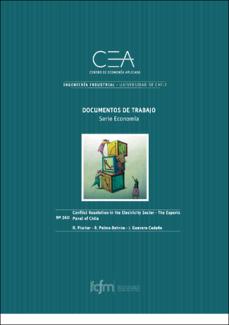El sistema se apagará debido a tareas habituales de mantenimiento. Por favor, guarde su trabajo y desconéctese.
Conflict Resolution in the Electricity Sector - The Experts Panel of Chile
| dc.contributor.author | Fischer, R. | |
| dc.contributor.author | Palma-Behnke, Rodrigo | |
| dc.contributor.author | Guevara Cedeño, Jessica | |
| dc.date.accessioned | 2017-07-31T20:29:04Z | |
| dc.date.accessioned | 2017-07-31T20:29:04Z | |
| dc.date.available | 2017-07-31T20:29:04Z | |
| dc.date.available | 2017-07-31T20:29:04Z | |
| dc.date.issued | 2012-07-01 | |
| dc.date.issued | 2012-07-01 | |
| dc.identifier.uri | http://ridda2.utp.ac.pa/handle/123456789/2388 | |
| dc.identifier.uri | http://ridda2.utp.ac.pa/handle/123456789/2388 | |
| dc.description | One of the main challenges facing the electricity sector worldwide is the design of efficient markets. In particular, the mechanisms used to solve regulatory conflicts are a crucial element of a regulatory regime and a major determinant of the risks borne by private investors. We use the Chilean experience to analyze the evolution of mechanisms for conflict resolution within the electricity sector. We propose a theoretical framework based on bargaining theory to explain the behavior of market agents. This methodological approach is used to explain the evolution of conflict resolution following the introduction of the Experts Panel in 2004, as well as to explain the reduction in the number of conflicts. The results can also be applied to other electricity markets, leading to future market design proposals and governance improvements. | en_US |
| dc.description.abstract | One of the main challenges facing the electricity sector worldwide is the design of efficient markets. In particular, the mechanisms used to solve regulatory conflicts are a crucial element of a regulatory regime and a major determinant of the risks borne by private investors. We use the Chilean experience to analyze the evolution of mechanisms for conflict resolution within the electricity sector. We propose a theoretical framework based on bargaining theory to explain the behavior of market agents. This methodological approach is used to explain the evolution of conflict resolution following the introduction of the Experts Panel in 2004, as well as to explain the reduction in the number of conflicts. The results can also be applied to other electricity markets, leading to future market design proposals and governance improvements. | en_US |
| dc.language | eng | |
| dc.language.iso | eng | en_US |
| dc.rights | https://creativecommons.org/licenses/by-nc-sa/4.0/ | |
| dc.rights | info:eu-repo/semantics/openAccess | |
| dc.subject | Market design | en_US |
| dc.subject | conflict resolution | en_US |
| dc.subject | Experts Panel | en_US |
| dc.subject | bargaining | en_US |
| dc.subject | game theory | en_US |
| dc.subject | Market design | |
| dc.subject | conflict resolution | |
| dc.subject | Experts Panel | |
| dc.subject | bargaining | |
| dc.subject | game theory | |
| dc.title | Conflict Resolution in the Electricity Sector - The Experts Panel of Chile | en_US |
| dc.type | info:eu-repo/semantics/article | |
| dc.type | info:eu-repo/semantics/publishedVersion |
